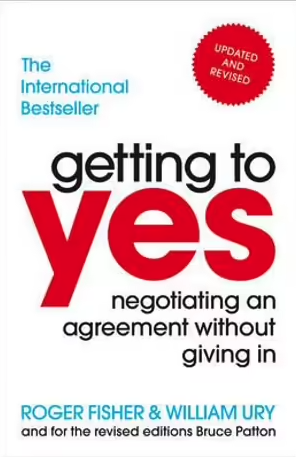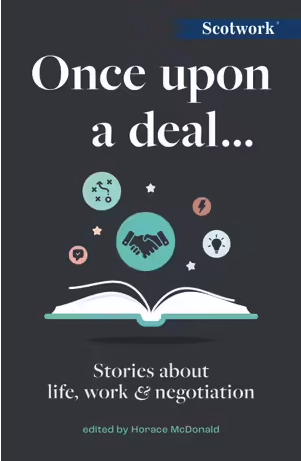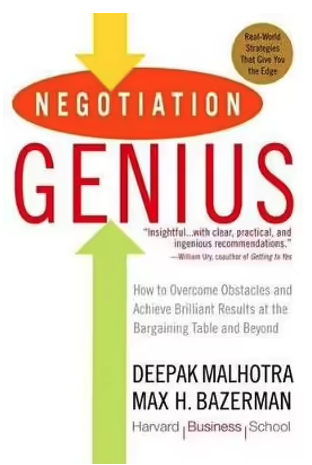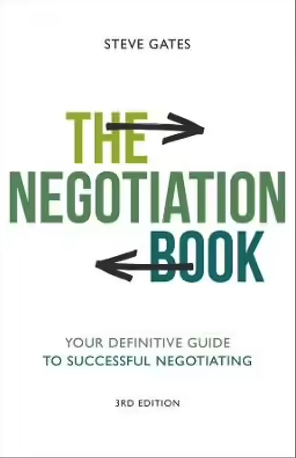4 of the Best Books on How to Negotiate in Business and Win!

4 of the Best Books on How to Negotiate and Win!
When it comes to selling a business, your negotiation skills play a vital role in securing a favourable outcome that ensures both the continued success of your business and a smooth transition to the right buyer.
Negotiation is an essential skill in both personal and professional realms. Whether you're navigating business deals, salary negotiations, or resolving conflicts, the ability to negotiate effectively can make a significant difference in achieving your desired outcomes. Fortunately, there are several insightful books available that provide valuable strategies and techniques to help you become a skilled negotiator.
Here are 5 books to improve your negotiation skills. While these books aren't exclusively focused on selling a business, they offer valuable strategies and techniques that can help you in achieving the best deal possible.
1. Getting To Yes: Negotiating an agreement without giving in
By Roger Fisher, William Ury
A new edition of a classic: with over 2 million copies sold in over 20 different languages, Getting to Yes is the most successful book on negotiation on the market!
"Getting to Yes" has been in print for over thirty years, and in that time has helped millions of people secure win-win agreements both at work and in their private lives. Getting to Yes simplifies the whole negotiation process, offering a highly effective framework that will ensure success.
"Getting to Yes" emphasizes the importance of a principled negotiation approach, where the focus lies on separating people from the problem and working towards a solution that satisfies the interests of all parties involved. The authors introduce the concept of "principled negotiation" or "win-win negotiation," which emphasizes the exploration of options that create value and foster long-term relationships.
Key Takeaways:
- Focus on interests, not positions: The book highlights the significance of understanding the underlying interests of all parties involved in a negotiation. When selling a business, this means understanding the motivations and goals of both the buyer and the seller, beyond their initial positions and demands. By identifying shared interests, negotiations can be steered towards a mutually beneficial outcome.
- Generate options for mutual gain: The authors stress the importance of brainstorming and exploring multiple options that create value for both parties. When selling a business, this approach encourages the identification of creative solutions that meet the buyer's needs while ensuring a fair outcome for the seller. It opens up possibilities for win-win scenarios and increases the likelihood of reaching an agreement that satisfies all parties involved.
- Separate people from the problem: The book emphasizes the need to focus on the problem at hand and separate it from personal emotions and relationships. When selling a business, this is crucial to maintain a constructive and professional atmosphere throughout the negotiation process. By depersonalizing the discussion, both parties can objectively analyze the business's value and reach a fair agreement based on facts and market conditions.
- Develop objective criteria: The authors suggest using objective criteria as a basis for decision-making in negotiations. When selling a business, objective criteria may include market value, financial projections, industry benchmarks, and other relevant factors. By relying on these criteria, both the buyer and the seller can ensure a fair and transparent evaluation of the business, increasing the chances of reaching a successful deal.
Selling a business involves a complex negotiation process where the stakes are high, and emotions can run high as well. "Getting to Yes" provides a practical framework for approaching negotiations in a manner that maximizes value and preserves relationships.
By applying the principles outlined in the book, business owners and entrepreneurs can navigate the sale of their business with greater confidence and skill. Understanding the interests of potential buyers, generating creative options, separating personal emotions from the negotiation, and relying on objective criteria for decision-making can significantly enhance the chances of a successful sale.
Whether you are a business owner looking to sell your business or a professional involved in negotiations, "Getting to Yes" offers timeless wisdom and practical strategies to achieve mutually beneficial agreements without compromising your position or integrity.
2. Once Upon a Deal... Stories about life, work and negotiation
By Horace McDonald
Negotiation is everywhere. Even though we use it all the time - at work, at home, with family and friends - many of us are negotiating without realising it. Negotiation can be described as the process of getting what we want, from people who want something from us and is an art built around the science of a defined process, the Scotwork 8-Step Framework.
"Once Upon a Deal" presents a collection of stories that span a wide range of negotiation contexts, including business deals, interpersonal relationships, and everyday situations. Each story is followed by a reflection that highlights the negotiation strategies and principles employed. Through these engaging narratives, the author explores the dynamics of negotiation, the importance of effective communication, and the art of reaching mutually beneficial outcomes.
Key Takeaways:
-
Building relationships: The book emphasizes the significance of building strong relationships and rapport during negotiations. In the context of selling a business, establishing trust and open lines of communication with potential buyers can greatly impact the outcome of the deal. The stories in the book highlight the power of forging connections and fostering a sense of mutual understanding and respect.
-
Understanding perspectives: "Once Upon a Deal" emphasizes the importance of understanding different perspectives in negotiation. By stepping into the shoes of the other party, business owners can gain valuable insights into the buyer's motivations, concerns, and goals. This understanding allows sellers to tailor their negotiation strategies to meet the needs and interests of potential buyers effectively.
-
Creative problem-solving: The author emphasizes the value of creative problem-solving in negotiation. In the process of selling a business, unexpected challenges may arise that require innovative solutions. The book's stories demonstrate how thinking outside the box and considering unconventional approaches can lead to breakthroughs and win-win outcomes.
-
Effective communication: The book underscores the role of effective communication in negotiation. Clear and concise communication, active listening, and the ability to articulate one's interests and concerns are vital when selling a business. The stories in the book shed light on the impact of effective communication on building trust, resolving conflicts, and reaching favorable agreements.
"Once Upon a Deal" offers valuable insights into negotiation dynamics that can be directly applied to the process of selling a business. The book's stories provide relatable examples that shed light on the challenges and opportunities faced by business owners during negotiations.
By drawing connections between the anecdotes and the sale of a business, readers gain practical guidance on navigating the complexities of this particular negotiation process. The book's lessons on building relationships, understanding perspectives, employing creative problem-solving, and effective communication can help business owners enhance their negotiation skills and maximize the value of their business sale.
Furthermore, the storytelling approach of "Once Upon a Deal" makes it an engaging and relatable read. The narratives capture the essence of negotiation and inspire readers to reflect on their own negotiation experiences, fostering personal growth and development.
3. Negotiation Genius: How to overcome obstacles and Achieve brilliant results at the bargaining table and beyond
From two leaders in executive education at Harvard Business School, here are the mental habits and proven strategies you need to achieve outstanding results in any negotiation.
Drawing from extensive research and real-life examples, "Negotiation Genius" offers a wealth of strategies, tactics, and principles to become an effective negotiator. The authors emphasize the importance of preparation, understanding the other party's perspective, and creative problem-solving to overcome obstacles and reach optimal outcomes. Through compelling stories and actionable advice, the book equips readers with the tools needed to navigate complex negotiations successfully.
Key Takeaways:
-
Strategic preparation: "Negotiation Genius" emphasizes the significance of thorough preparation before entering into any negotiation. This involves researching the market, understanding the value of the business being sold, and identifying potential challenges and opportunities. When selling a business, being well-prepared positions the seller to negotiate from a position of strength and enhances their ability to anticipate and address buyer concerns effectively.
-
Expanding the pie: The authors advocate for a mindset that focuses on expanding the value and finding creative solutions that benefit all parties involved. In the context of selling a business, this approach entails identifying opportunities to enhance the deal's value beyond the initial terms. By offering incentives or exploring additional opportunities for collaboration, sellers can make the business more appealing to potential buyers, increasing the chances of a successful sale.
-
Understanding the other party: "Negotiation Genius" emphasizes the importance of empathy and understanding the other party's perspective. When selling a business, understanding the buyer's motivations, goals, and constraints enables the seller to tailor their negotiation strategy accordingly. By addressing the buyer's needs and concerns, the seller can create a win-win situation that fosters a mutually beneficial agreement.
-
Managing emotions and ethics: The book highlights the role of emotions in negotiation and the importance of managing them effectively. Emotional intelligence, self-control, and ethical decision-making are crucial when selling a business. By maintaining a calm and composed demeanor and adhering to ethical principles, the seller can build trust and credibility, facilitating a more productive negotiation process.
"Negotiation Genius" provides invaluable insights and techniques that can be applied to the process of selling a business. The book's emphasis on preparation aligns with the need for thorough due diligence and understanding the market dynamics when valuing and presenting the business for sale.
Furthermore, the strategies presented in the book, such as expanding the pie and understanding the other party, are highly relevant in the context of negotiating a business sale. By exploring creative options and addressing the buyer's needs and concerns, sellers can enhance the attractiveness of their business and achieve a mutually beneficial agreement.
The book's focus on managing emotions and ethics is also crucial when selling a business. The emotional attachment that owners often have toward their businesses can influence the negotiation process. "Negotiation Genius" offers valuable advice on maintaining emotional control and making ethical decisions to ensure a fair and successful sale.
4. The Negotiation Book: Your definitive guide to successful negotiating
by Steve Gates
We all have to negotiate at some point; whether in the office or at home. Successful negotiating can lead to great results that can in turn have a profound effect on our lives – financially, personally and professionally. No other skill will give you a better chance of optimizing opportunities in life.
"The Negotiation Book" provides a step-by-step framework for mastering the art of negotiation. Steve Gates covers various aspects of negotiation, including preparation, building relationships, effective communication, and closing deals. The book combines theory with real-life examples and practical exercises to help readers develop their negotiation skills and achieve favorable outcomes in any negotiation situation.
Key Takeaways:
-
Preparation and planning: The book emphasizes the importance of thorough preparation before entering into any negotiation. This involves researching the market, understanding the value of the business being sold, and identifying potential challenges and opportunities. When selling a business, being well-prepared positions the seller to negotiate from a position of strength and enhances their ability to anticipate and address buyer concerns effectively.
-
Building relationships: "The Negotiation Book" underscores the significance of building strong relationships based on trust and mutual respect. In the process of selling a business, fostering a positive relationship with potential buyers can greatly influence the negotiation outcome. Building rapport, active listening, and understanding the buyer's needs and motivations create a foundation for constructive and collaborative negotiations.
-
Effective communication: The author emphasizes the role of effective communication in negotiation. Clear and concise communication, active listening, and the ability to articulate one's interests and concerns are vital when selling a business. "The Negotiation Book" provides practical advice on how to communicate effectively, ask probing questions, and present arguments persuasively to influence the negotiation in the seller's favor.
-
Win-win outcomes: The book promotes a collaborative approach to negotiation, aiming for win-win outcomes whenever possible. When selling a business, the focus is not only on securing a favorable deal for the seller but also on creating value for the buyer. By identifying mutually beneficial solutions, such as flexible payment terms or post-sale support, the negotiation can result in a positive outcome for both parties.
Connection to the Process of Selling a Business: "The Negotiation Book" provides valuable guidance that can be directly applied to the process of selling a business. The book's comprehensive framework helps business owners navigate the intricacies of negotiation, ensuring a smoother and more successful sale.
By incorporating the book's principles and techniques, sellers can approach the negotiation process with confidence and strategic thinking. Thorough preparation and understanding the buyer's perspective allow sellers to address concerns and position the business's value effectively. Building strong relationships with potential buyers fosters a collaborative negotiation environment, increasing the likelihood of reaching mutually beneficial agreements.
The book's emphasis on effective communication is essential in selling a business, where conveying the business's value and addressing buyer inquiries are crucial. By utilizing the communication strategies outlined in "The Negotiation Book," sellers can articulate their interests and concerns persuasively, leading to more favorable negotiation outcomes.
Negotiation is an art that can be mastered through knowledge, practice, and the guidance of experienced negotiators. Engaging a business broker in the process can significantly improve the negotiation and outcomes of your business sale. Though as a business owner, learning negotiation tactics can help you during the business sale process.
Remember, negotiation is not just about winning; it's about finding mutually beneficial solutions that satisfy all parties involved. By applying the principles and strategies outlined in these books, you can approach negotiations with confidence, empathy, and a strategic mindset.
Tags: negotiations business owners success selling
About the author

Vanessa Lovie
CEO Bsale Australia
Vanessa is the current manager and CEO of Bsale Australia. Over the past 11 years as a business owner, she understands what it takes to grow a ...










